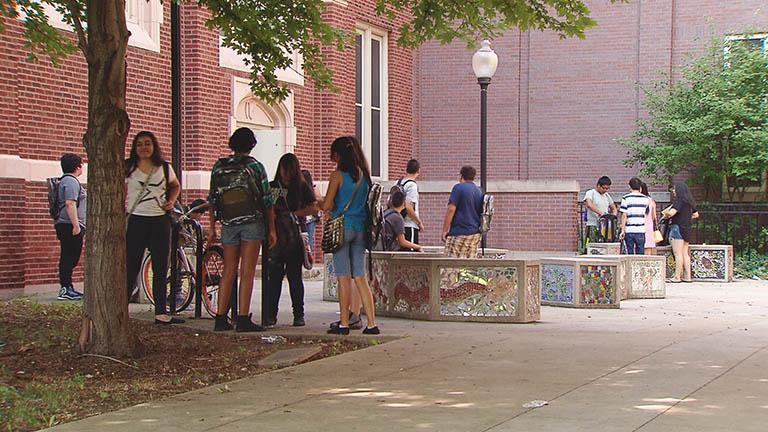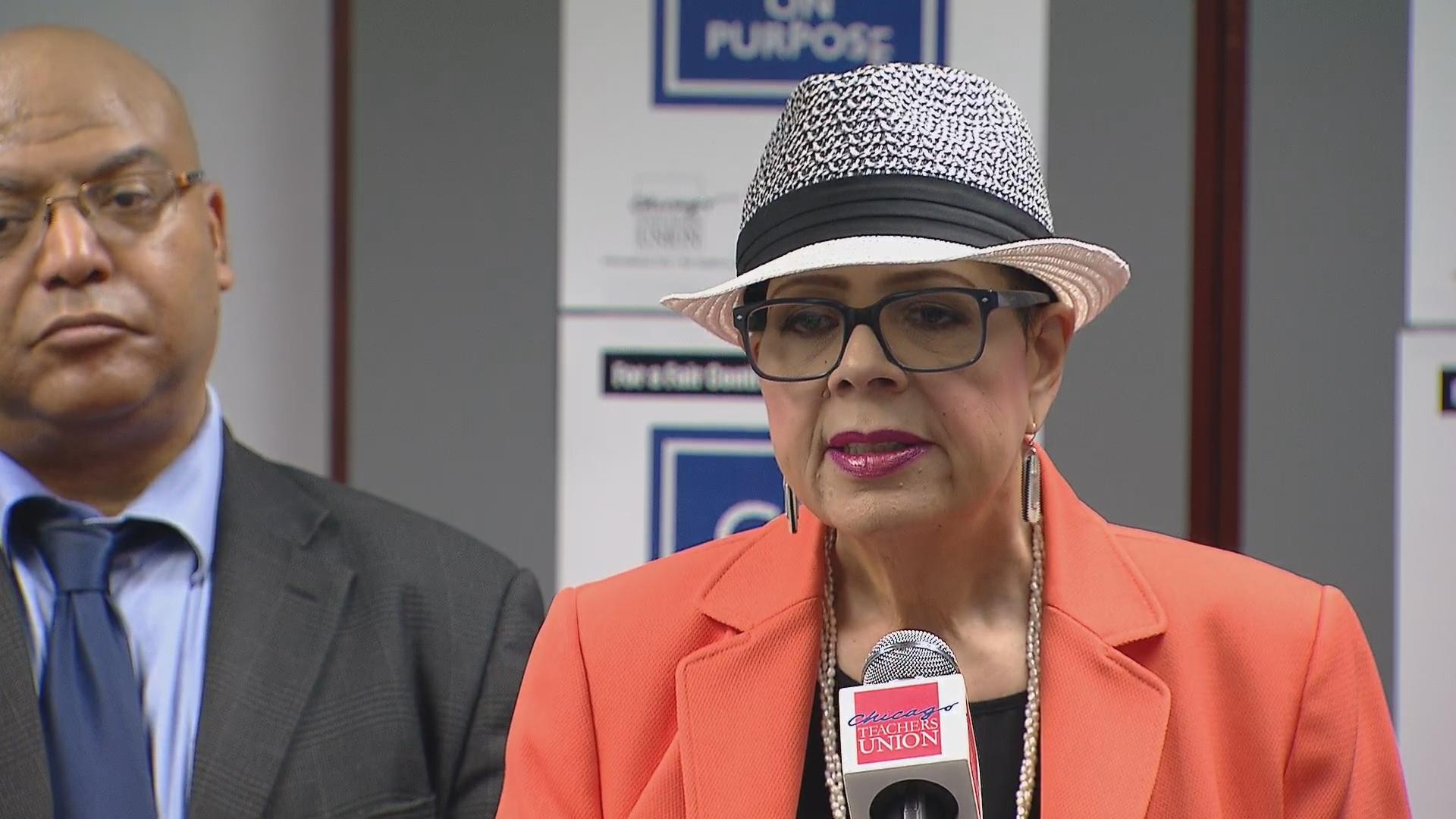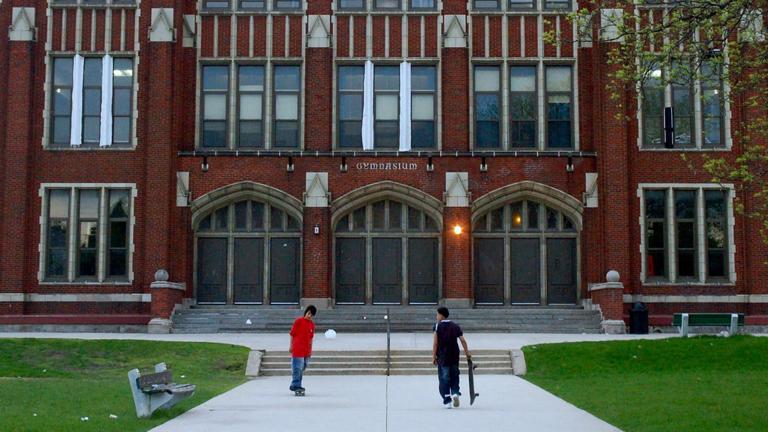 (jeco / Flickr)
(jeco / Flickr)
Despite darkening storm clouds that have been looming over Chicago Public Schools’ finances, two reports released this week show some rays of sunshine for student academics.
The most recent report from the University of Chicago Consortium on School Research (CCSR) shows an increase in the number of CPS ninth-grade students who will go on to earn a bachelor’s degree within six years.
The report estimates that as of 2015, 18 percent of CPS ninth-graders will earn a four-year college degree within 10 years of starting high school, compared to 17 percent in a 2014 report.
"The fact that we're seeing increases from the previous brief is impressive, because it's hard to see changes over time,” explained report co-author Jenny Nagaoka. “To be honest, I wouldn't have expected to see any kinds of increase in the course of one year, knowing how hard change is."
In 2006, the consortium reported that merely 8 percent of CPS ninth graders would earn a college degree within six years of graduating.
The percentage is based on the Bachelor’s Degree Attainment Index, or Bachelor's DAI, which uses data over multiple years, not actual numbers from any specific graduating classes.
The report also examined the percentage of students who go directly to a four-year college, versus those who take a different path to obtaining a post-secondary degree.
Sixteen percent will take the straightforward path, earning a bachelor’s degree within six years of starting college.
“I think what we're also trying to signal is how complicated the paths can be to get a four-year college degree," Nagaoka said. Some students enroll in a two-year college before transferring to a four-year college, she explained, and some students take a year off.
"There are also some students who just struggle to make the immediate transition, but through support from family or community organizations, or their own will, they end up in a four-year college," said Nagaoka. "I'm more worried about the students who want to get a bachelor’s degree but aren't getting the support they need or plans fall apart, so they're not actually on campus the fall after high school graduation."
The report credits the district’s increased high school graduation rates for the increased index, along with higher college enrollment and graduation rates.
The 2015 CPS high school graduation rate is 74 percent, compared to 57 percent in 2006. Because the 2015 freshmen on-track rate (considered an indicator of a student’s likelihood to graduate) is 85 percent, report authors estimate the city’s graduation rate will continue to increase in coming years.
Report authors also cite the district’s average ACT score is up from 17.6 for the class of 2006, to 18.5 for the class of 2014. And the proportion of students scoring a 21 or better on the ACT is up to 30 percent in 2014, from 23 percent in 2006.
The district’s four-year college enrollment rate is 42 percent, up from 33 percent in 2006. Twenty percent of 2014 CPS grads enrolled in a two-year college.
The 2014 six-year graduation rate for CPS students enrolled in four-year colleges is 50 percent, a four-point increase since 2009.
Nagaoka cautions that while the figures show the students and teachers of CPS are making progress—despite the perpetual budget crisis and turmoil—not all CPS students who enroll in college are prepared.
“We have 30 percent of high school graduates have at least a 21 on the ACT, which is a rough sense of where college readiness lies. That's an improvement, but that does mean 70 percent of students scored below 21. Not all of them are going to college,” Nagaoka explained. “With GPA, we're now at 29 percent of students who graduated with a 3.0, which is an improvement over 2006, but it still leaves 71 percent of students who have below that.
"We're seeing improvement but there are still a lot of students are likely to struggle academically when they reach college,” she said.
Next week, CCSR plans to release a complete report on the district’s high school graduation rates. An executive summary of the report shows the district’s graduation rate up 22 percent over the last 16 years.
“It's absolutely progress. When you see how we're catching up to the rest of the nation, it is really impressive. And you don’t see, typically, massive jumps at one time,” said the district’s chief officer for college and career success, Alan Mather. “[It’s] due to thoughtful planning and creation that leads to this kind of sustained growth.”
However, Mather acknowledges the district has a long way to go.
“A lot of the work is centered around this idea of competency-based learning: are we measuring what we need to measure? As we look at the personalized learning environment, we know not every student learns the same way,” he said. Moving toward a more “skill-based” way of evaluating students from the Common Core State Standards and content specifics will enable educators to know how to target more specific support for students.
But this news of success comes at a time when state lawmakers are at odds with Gov. Bruce Rauner over how to fund education. Mather warns against a rollback of these educational gains if a solution isn’t reached.
“I think we're all concerned that the gains we've had so far are going to be potentially at-risk due to inability of our leaders in Springfield to come together and make decisions,” he said. “This whole idea that they're talking about 'bail-out' of CPS, we're talking about children for whom 85 percent are in poverty. That doesn't seem like a group one would have to bail out or use that language for. It's all at risk if we're not able to continue to support students the way we have.”
Follow Brandis Friedman on Twitter: @BrandisFriedman
Sign up for our morning newsletter to get all of our stories delivered to your mailbox each weekday.
More education stories from ‘Chicago Tonight’
 CPS Students Asked to Take Pledge for Peace as Summer Break Nears
CPS Students Asked to Take Pledge for Peace as Summer Break Nears
June 8: Amid concerns that the summer months will see an escalation of violence in the city, some students at Chicago Public Schools will take a pledge on Thursday to promote peace during the summer break.
 Chicago Teachers Union Wades Into Funding Debate
Chicago Teachers Union Wades Into Funding Debate
June 2: The day after Chicago Public Schools CEO Forrest Claypool warned that schools may not open in September, the Chicago Teachers Union weighed in, calling Claypool's leadership a failure. We hear arguments from both sides.


